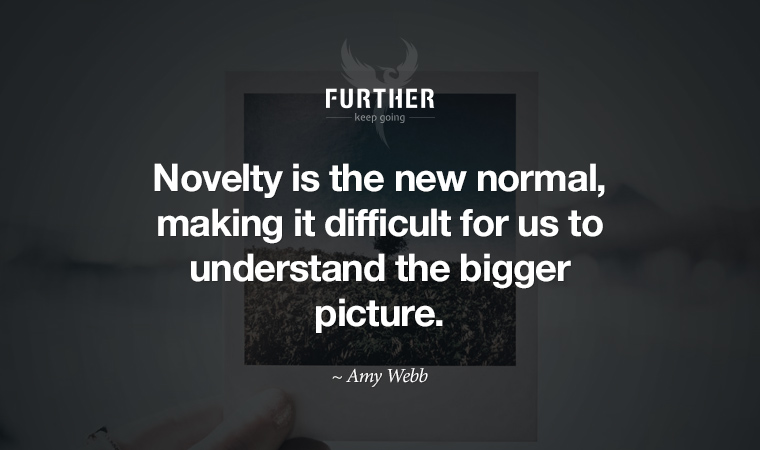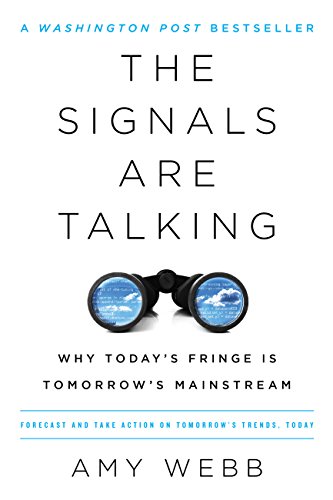
We often talk about the near future here on Further. It’s an important exercise that allows us to survive and thrive economically by making smart adaptive choices.
That’s not to say that we can predict the future. We can’t, because the future is not predetermined, and we effectively create the future through our collective choices. Plus, once a new trend emerges, it evolves through the very process of our anticipating where it’s going.
COVID-19 is a perfect illustration. Although we’ve known that a global pandemic was inevitable, we didn’t know when or what it would specifically look like. Worse, the ramifications that are currently playing out leave more uncertainty than clarity about what’s going to result.
That said, there are plenty of probable outcomes that we can anticipate and plan for. It’s still tricky, given that the rate of technological advancement had already sped ahead of a comfortable pace … and that was before the pandemic threw accelerant on the fire of change.
Futurists think in terms of probable, plausible, and possible scenarios for the future, concepts that are borrowed from the discipline of statistics. As you might guess, probable scenarios get the lion’s share of attention from people trying to make strategic decisions, although pondering the plausible and possible can help as well.
This is also a healthy way for you to think about your personal future, so you can position yourself to create your outcomes, instead of it just letting them happen to you. Educating yourself on trends and probable near-future scenarios should simply become part of living life in the 2020s and beyond.
But it’s also important, first and foremost, to understand what probable means. Technologies like automation, artificial intelligence, augmented and virtual reality, blockchain, and 3D printing are not probable — they’re already here. They’re just not evenly distributed, as William Gibson once said about the future in general.
So what you have to do is consider the probable implications of these technologies, both in general and to your situation specifically. Even trickier is to realize that the convergence of these different disciplines can lead to big disruptive changes that appear to come out of nowhere.
The point about convergence is perfectly illustrated by the probable effects of the pandemic going forward. Technology trends that were already well in motion are being accelerated due to this novel inflection point in history.
It takes a lot more than a few articles to get a grasp on the decisions you should make. But you have to start somewhere, so I selected a few pieces that outline the probable implications of COVID-19 on society and technology.
Society
Lucid article from the BBC that asks the question: Could the huge shifts in our way of life being introduced as part of the fight against Covid-19 pave the way for a more humane economy?
How Will Coronavirus Change the World?
Technology
The pandemic has effectively hit a “fast-forward” button on many tech trends that were already in place. Here are some of the probable implications of Covid-19 on technology and business.
Coronavirus Is Changing How We Live, Work, and Use Tech—Permanently
Robotics
You may not have known it, but our robot overlords are already among us. They’ll start off in takeout food delivery and work their way up from there. Might as well be nice to them.
The Pandemic is Bringing Us Closer to Our Robot Takeout Future
3D Printing
3D printing is primed to revolutionize manufacturing during this decade, and we are already printing houses and boats. The pandemic has increased mainstream awareness of the technology through the printing of ventilators and now test swabs.
The Race to 3D-Print 4 Million COVID-19 Test Swabs a Week
Virtual Reality
Virtual reality and its cousin augmented reality have been on the cusp of the mainstream for awhile, and yet have largely remained the domain of nerdier types. That’s likely going to change now, and the implications are very much worth exploring.
Zoom Parties Are So Five Weeks Ago: Hello Virtual Reality
For a deeper dive into trend forecasting, check out this week’s book selection. Below that, Trudi helps you with your perfectionist tendencies. And in the Flashback, we’ve got the soundtrack for your weird pandemic dreams.
Keep going-
P.S. Did someone forward this issue of Further to you? We’d love to have you join us by signing up here.
further: books
The Signals Are Talking: Why Today’s Fringe Is Tomorrow’s Mainstream
 Most books about the near-future simply tell you what the author thinks is coming, leaving you to pick the prognostication you prefer. The Signals Are Talking shows you where and how to look in the present for harbingers of the future. (Amazon)
Most books about the near-future simply tell you what the author thinks is coming, leaving you to pick the prognostication you prefer. The Signals Are Talking shows you where and how to look in the present for harbingers of the future. (Amazon)
When you buy a book through us, we get a store credit to buy more books. Thank you!
Progress is its Own Perfection

By Trudi Roth
Being at the middle stage of life has its benefits, both personally and professionally. For the most part, we’re confident in our abilities and are striving for mastery, if not perfection.
And then, crisis hits. With everything upended, there is no clear context for decision making today, no apparent roadmap to tomorrow.
This is a weird limbo to live in. And it’s compounded by what others around you are doing — for example, there are the shiny, happy types who elevate #quarantinelife to an art form. Others aspire to no more than getting through this in one piece, which is more realistic but also may not work so well if your livelihood is performance-driven.
Navigating the two extremes to stay on track is a discipline that’s less about clinging to one ideal or the other, and more about being limber.
Brain freeze
There’s a mantra that leading architects of change (not to mention mental health proponents) embrace: progress over perfection.
The problem is that kind of mental agility does not come naturally.
“Evolution has wired our minds for distraction, as in eons past, constant attention to a dangerous landscape helped us survive. They are also wired for empathy, as this helped us gather in groups and create communities. And they are wired for ego, the most basic mechanism of self-preservation.”
So it’s easy to get tripped up by how our brains are hardwired. The trick is to recognize the traps and plan a more fluid way forward.
Think fast
Distractions are always challenging, but they’re next-level in a crisis. Take a deep breath — literally — as the best way to combat distraction is to become mindful of where you place your focus and awareness. Focus lets you zoom in on the details, while awareness adds big-picture context, so you can “separate the signals from the noise.”
Empathy may also be compromising your ability to act effectively. While it may seem like an appropriate response, particularly in troubled times, too much emotional resonance can derail you. Instead, choose compassion, which allows you to act with kindness and concern without compromising your agility.
And finally, if there were ever a time to put your ego aside, it’s during a crisis. What you did in the past doesn’t matter in the face of an uncertain future. Instead, tap into your areas of confidence and conviction and focus on being helpful. Selflessness is a simple pivot that propels you (and those you serve) forward.
In a crisis and well, always, remember that we are each a work in process— and progress. The goal is not to be perfect, just to keep going.
Perfectionism Will Slow You Down in a Crisis (Harvard Business Review)
further: flashback

Metallica – Enter Sandman
The Black Album, 1991
Everyone seems to be having weird dreams during the pandemic. I know I have. Enter Sandman by Metallica likely won’t help with that, but at least you can rock out a bit. (YouTube)
further: sharing
Please forward this issue of Further to a friend. Thank you!
